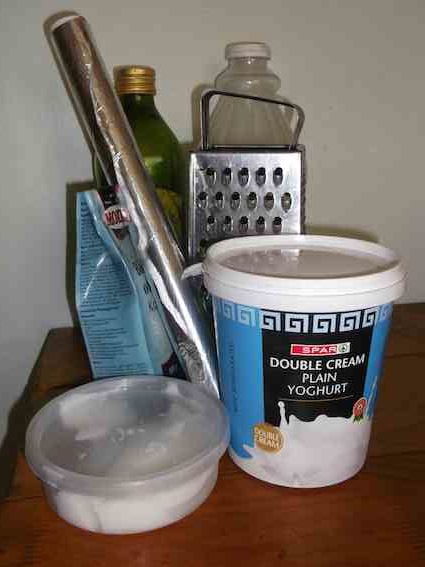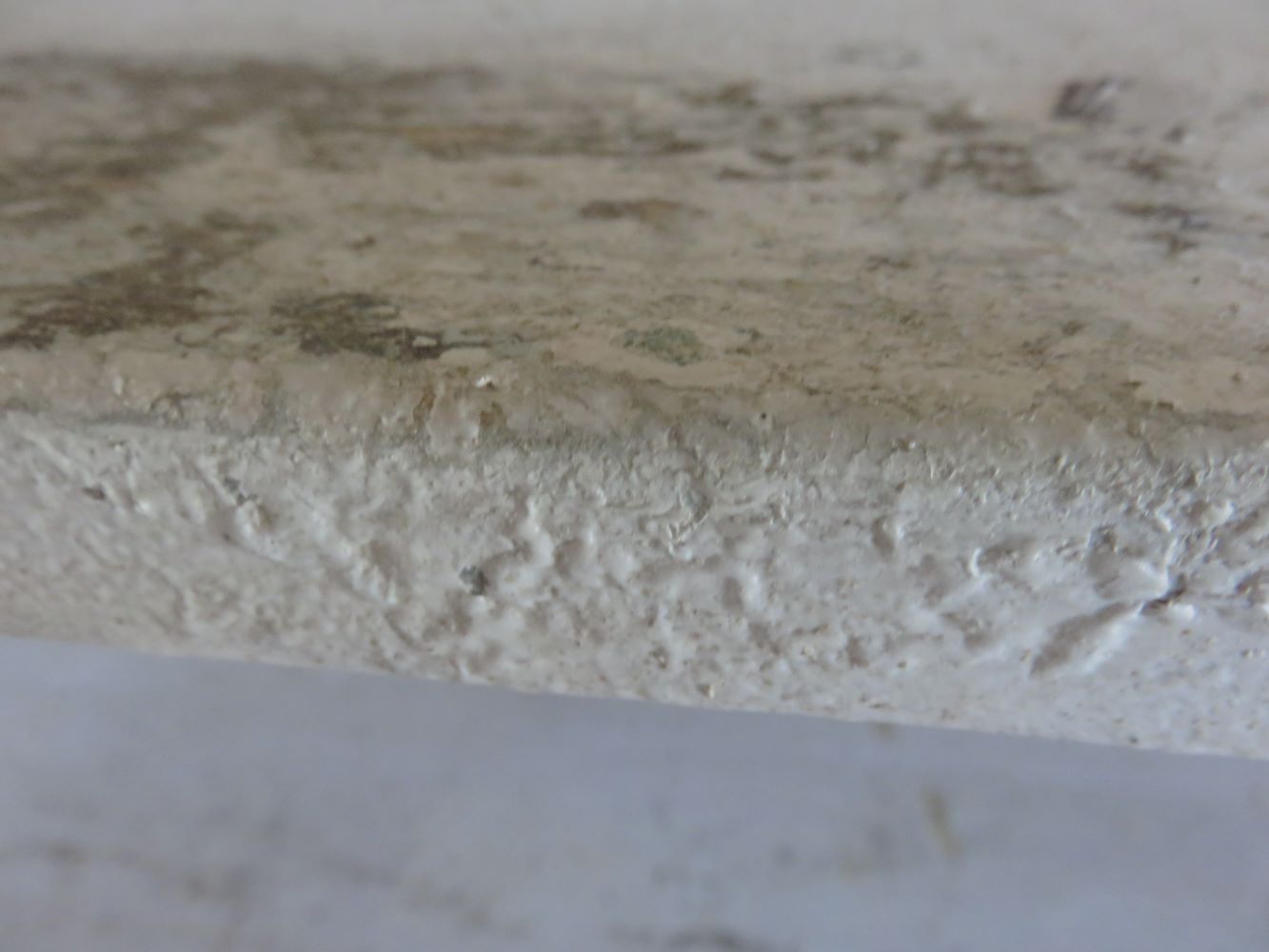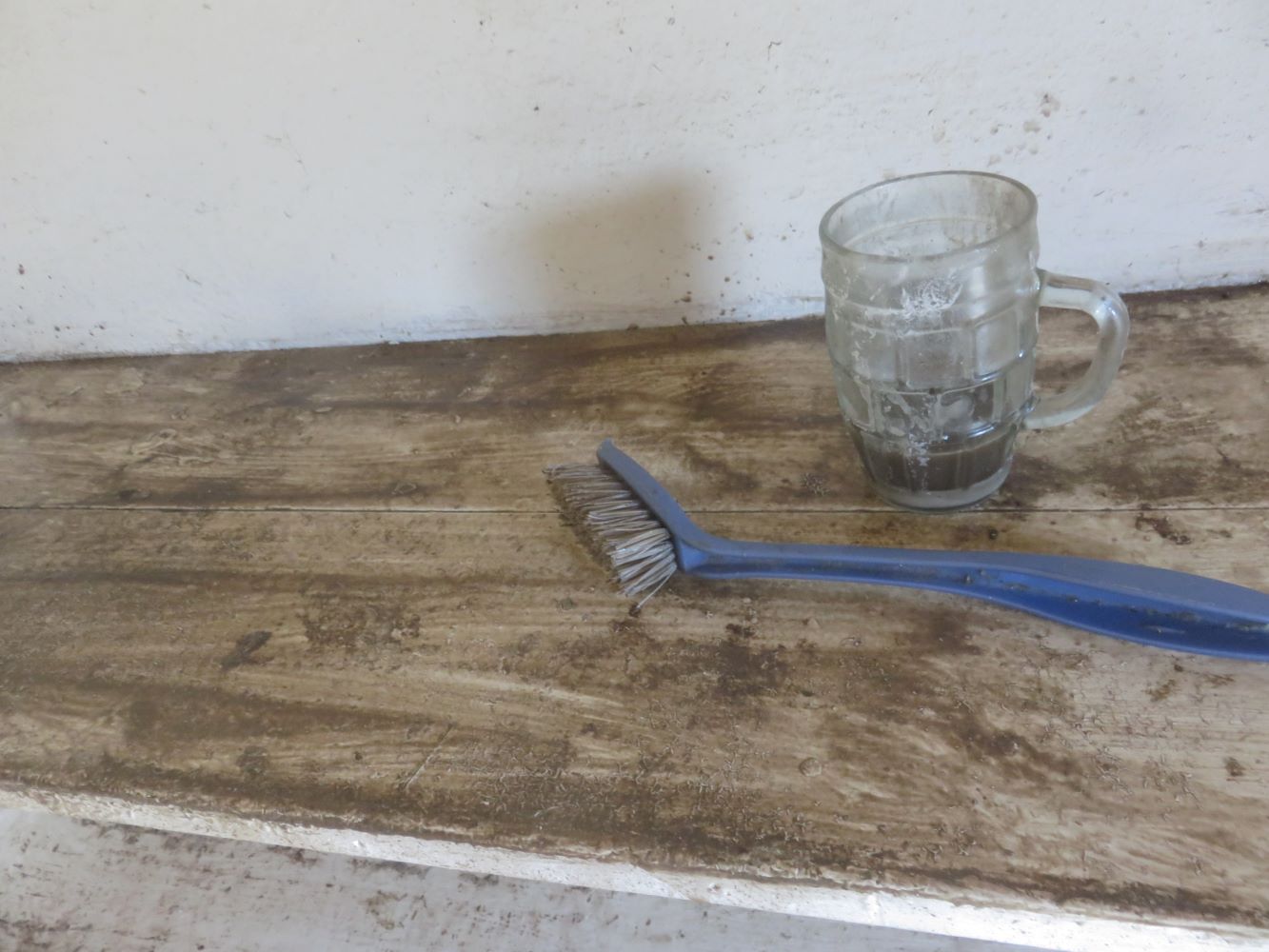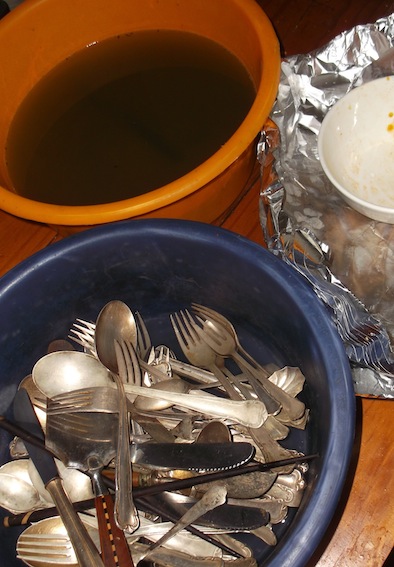Dear Reader, in this age of AI created content, please support with your goodwill someone who works harder to provide the human-made. Sign up in the righthand column or bottom of this page. You will receive my hand illustrated monthly newsletter RESTORE NATURE and access to the biodiversity garden design course as I write...and nothing else, I respect your time.
eco friendly household products made from cooking supplies
eco friendly household products for cleaning:
Dear green housekeeper, here are some eco friendly household products made from cooking supplies. The ingredients are cheap, readily available, and they are mostly my own or family recipes, tried and tested over a number of years or gained from my experience as a professional house-cleaner. They are also triply green, using non polluting materials, recycled materials, and materials friendly to your skin, lungs and possessions.

General all round cleaners
 kitchen shelf pre bicarb kitchen shelf pre bicarb |
 post bicarb post bicarb |
The most versatile cleaner I know is baking soda. I've cleaned ovens, filthy dried grease on kitchen shelves, glass and plastic appliances with old caked on dirt, grease deposits on the tops of kitchen cupboards and more. Its my go to cleaner. Lets just call it Mrs Muscle in homage to the unpaid women's work of the centuries, because this too comes free ! It cuts grease like nothing I know. It can blister enamel paint on wood, so take care to wipe on and wipe off quickly with that material. A teaspoon of soda with half a cup of boiling water is a good amount to start with and keep making more fresh warm solution as you need it till the job is done. Apply the solution, or a wet paste of soda if the grease is really tough, and simply brush off with a soft brush, or wipe off . A rinse with lots of water and some vinegar prevents salty encrustations when it dries.They have even found it is the most effective means of removing pesticides from vegetables and fruit !
 bicarb or heat blistered paint bicarb or heat blistered paint |
 The dirt removing process The dirt removing process |
metal
Green metal stains on bare wood causes by wire wool
Yoghurt
Coat the area in plain yoghurt, leave ten
minutes and wipe away.
Dirty copper
Vinegar and rags
Soak rags in vinegar. Wrap brass object. Cover with an old plastic bag. After several hours unwrap and polish it. Repeat as needed. Also works for brass.
Dirty
etched or inscribed brass
Mayonnaise and plastic bags.
Smear mayonnaise over brass. Lay plastic bag over mayonnaise and press down lightly. Leave for several hours. Brush off and polish. After enough repeats, the mayonnaise will clean the indentations in the brass.
Silver cutlery
Old used tin foil, non metal heat tolerant bowl, baking soda, salt.
Line bowl with tin foil. Place two teaspoons of salt and soda in the bottom. Boil a kettle of water and pour over the crystals. Add the silver immediately. It will fizz, and you can watch the silver oxide fall away, and smell the Sulphur. Take out and polish. Repeat till sparkling.

The filthy black water in the orange bowl is from the oxide that has been electrically cleaned off the silver.
eco friendly household products for smelling good:
SOAPS AND DEODORANTS
Eco friendly household products can just be plain old fashioned ones sometimes. I hope you can you still buy bar soap for household use. Here in South Africa we still have 'Sunlight soap'. It comes in blocks, imprinted with the logo, and is jade
green, dense but translucent, and smells ... like sunlight soap... it
isn't meant to be alluring and that is its appeal for those of us with
allergies, for whom just a whiff of the artificial flower perfume in
most soaps sets off an attack of sneezing, asthma, or causes hives. A lot of these old fashioned soaps like Sunlight have a high sodium content, which is not good for soil fertility over the long term (decades of exposure). This is why I developed a potassium based soap for my wetland. But it a special product, not found in the average kitchen cupboard. You can view the wetland book at the top of the right hand column on this page.
Washing clothes and dishes
Sunlight soap
Grate a cake or bar of old fashioned green sunlight soap on a food grater and use instead of washing powder. Not only is this more biodegradable than washing powder, and less polluting for the water systems, it is less allergenic. My mother cured a skin rash caused by the contact with her clothes in hot weather, and lessened her asthma, by converting to Sunlight soap. I used to grate it, fill a bottle, and then top it up with water. It would turn into a jelly I kept in the fridge because it tended to go off after a week or so. I would just spoon some in with my washing and start the machine, or use it for the dishes.
Hair Deodorant
olive oil
Place a quarter of a teaspoon of olive oil in the palm of your hand, or less if you have shorter hair. Rub it into your hands and then into your hair. Brush through. Unlike the other oils like coconut, it does not go rancid, but deodorizes the hair, leaving no smell behind after a day. This means that if you regularly run warm water through your hair when you shower, to remove sweat from your scalp, and use the olive oil which lubricates but suppresses excessive oiliness of the hair, you can go without washing for months. I don't remember when last I washed my hair, and I don't have ‘greasy’ hair. I am doing this because as I got older, my hair, and especially my grey hair, became so wiry and brittle that shampoo dried it out completely, and I was intent on growing it as long as possible. Long hair can be dressed in a variety of ways, and need not be set in curlers or cut regularly, so I saved a lot of money. My Franco-German grandma had snowy white hair down to her knees when she was eighty, it’s a sort of family tradition.
Skin Deodorant
Mutton fat
Cook up some fatty mutton bones. Keep the hard mutton fat in the fridge. Place a tiny shaving of it in your palm and let it soften, and then smear it in your armpit and other areas which become sweaty. This is an old form of anti perspirant used by the original inhabitants and owners of all the land in my province, the Khoekhoe herdsmen and women. They also used butter which is full of lactobacteria. It suppresses the type of bacteria which promote the sour smell of perspiration. I have not tried butter, but the Khoikhoi used to perfume the butter and mutton fat with buchu or use the herb as a powder (a highly scented herb with a musky medicinal perfume: family Rutaceae,
Genus Agathosma, Diosma, Coleonema). The smell of the sheep fat and or the soured butter is itself quite identifiable, though pleasant, unless you put it on very thin, making one smell unusual in a city where other people use petrochemical antiperspirants and everything else that is natural has bad connotations. This one is gentle on your skin, and is environmentally friendly if not strictly vegetarian, in that it makes use of animal bones, normally thrown away and wasted. You can also eat the broth from the bones, to help fight against Osteoporosis, or put it on your pet's food to make it more attractive to them and more nutritious. Just don't give your dog too much fat. It causes liver damage.
eco friendly household products for:
flies
Dear green friend, you may feel a cursed by a biblical plague when so many flies crawl all over you and your food in summer, but don't use insecticides ! Insecticides can be of many kinds. Some insecticides leave residues which last a long time, and contaminate the environment and drinking water. They not only kill the flies that bother you inside your home, they can kill beneficial insects like bees out in the garden. They can damage you too if they are nerve poisons, and some of them, even plant based insecticides like pyrethroids, are known to have caused permanent nerve damage in some people. Spray insecticides also cause allergies and asthma, and can be distressing to visitors to your home. Eco friendly household products need not cost the earth, or pollute it. Fly traps can be made of recycled materials.
Fly trap for outside
An old plastic juice or drinks bottle, serrated knife, tape, animal poop
Cut the bottle off with the serrated knife about 1/3 of the way down its full length, just below the neck. Pierce the bottom half with the point of the knife in the upper half, to make many ventilation holes, too small for flies to exit, but not lower down or the schluk will run out on your shoes ! Pour half a cup of water and some poop (about 2 tablespoons) into the bottom half and stir a little with a twig. Flip the neck piece around so that the neck faces down into the bottle. Press down lightly and seal the edges with tape. Place in the garden if you have a lot of flies outside, where it cannot be knocked over, or hang it in a tree.
Flies inside the house
Glass bottle, old wine or vinegar.
Place a few inches of water and wine mix into a bottle and hide it in a corner where it cannot be knocked over. After a few days the flies will start to accumulate in the bottle. The more there are the more it will attract other flies.
Electric fly swatter
These work on batteries and kill the flies by electric shock, leaving a distinct singed smell. If you have a lot of flies you'll have to work hard. They are hard to catch and seem to sense the thing approaching, all charged up. It makes me queasy, and I fear for my karma.
eco friendly household products for:
TOILET SCALE
Dear eco friend, these eco friendly household products really work. I've tried them many times and they are just waiting in your kitchen cupboard. Its cheap, non polluting and the other commercial kind do not seem to be any more effective.
toilet scale on white ceramic piping
White vinegar and baking soda.
Empty toilet bowl, mix baking soda with water to form a thick paste and coat the scale. Leave for the night and scrub off. Empty the bowl again and fill with 50/50 water and vinegar. Soak overnight and scrub off. Repeat this process many times. Remove the stubborn scale with wet very fine grained sandpaper (it must be wet and fine or you will scratch the ceramic badly).
eco friendly household products and their advantages
The above eco friendly household products are safe to use, safe for the animals living around you, including your pets and the wildlife in the garden, and they are non polluting, using recycled or readily available cheap materials and they
cost very little. It is hardly believable that they work as well as or better than many commercial products for the same purpose, and treat your possessions and skin and hair more gently. Why do we buy the ready made stuff then, you may ask yourself. Why indeed. It's a deep and troubling question if you like to see yourself as a free agent, a thinking inhabitant of this modern world.
------
green home page for other eco friendly tips
------
greener homes, recycling and more
Restore Nature Newsletter
I've been writing for four years now and I would love to hear from you
Please let me know if you have any questions, comments or stories to share on gardening, permaculture, regenerative agriculture, food forests, natural gardening, do nothing gardening, observations about pests and diseases, foraging, dealing with and using weeds constructively, composting and going offgrid.
SEARCH
Order the Kindle E-book for the SPECIAL PRICE of only
Prices valid till 30.09.2023
Recent Articles
-
Geography Research Task
Jan 31, 25 11:37 PM
To whom it may concern My name is Tanyaradzwa Madziwa and I am a matric student at Springfield Convent School. As part of our geography syllabus for this -
Eco Long Drop Pit Latrines Uganda
Nov 29, 24 02:45 AM
Good evening from the UK. My name is Murray Kirkham and I am the chairman of the International and foundation committee of my local Lindum Lincoln Rotary -
Landscape Architect
Oct 01, 24 10:42 AM
I so appreciate your informative description! Your experimentation and curiosity with the seeds, germination, and rearing of the maggot are exciting to
"How to start a profitable worm business on a shoestring budget
Order a printed copy from "Amazon" at the SPECIAL PRICE of only
or a digital version from the "Kindle" store at the SPECIAL PRICE of only
Prices valid till 30.09.2023





